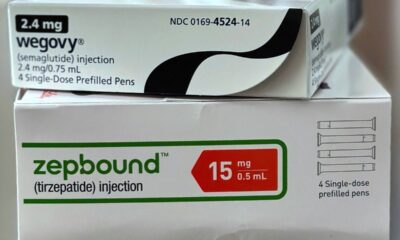Science
New Study Reveals Ozempic’s Impact on Alcohol Consumption

Researchers at Virginia Tech have uncovered significant findings regarding the effects of GLP-1 medications, such as semaglutide, the active ingredient in Ozempic and Wegovy, on alcohol consumption. Originally designed for diabetes management, these drugs have gained popularity for their weight loss benefits. Recent observations suggest they may also alter users’ cravings for alcohol, providing insights into their potential role in addiction treatment.
In a study published in Scientific Reports, participants who were administered GLP-1s reported a reduced desire to consume alcohol. The research involved 20 subjects who ingested three alcoholic drinks over an hour while their blood alcohol levels, glucose, and vital signs were monitored. Results indicated that those on GLP-1 medications experienced a slower increase in blood alcohol levels, resulting in a less intense feeling of intoxication.
This phenomenon may be attributed to the known effects of GLP-1 medications, which are believed to slow gastric emptying. As a result, alcohol may take longer to reach the bloodstream, diminishing its immediate effects. Alex DiFeliceantonio, a neuroscientist involved in the study, highlighted the implications of these findings, noting that “faster-acting drugs have a higher abuse potential.” He emphasized that if GLP-1s slow alcohol absorption, they could potentially help individuals reduce their alcohol intake.
The research points to a complex interaction between GLP-1s and the brain’s dopamine reward system. While it is established that these medications influence this system, the exact mechanisms remain unclear. The findings suggest that GLP-1s may not only change how the body processes alcohol but also how the brain perceives its rewarding effects.
Despite the promising nature of these results, the study’s small sample size necessitates further research to validate these findings. Understanding how GLP-1 medications can be utilized in addiction treatment could have significant implications for public health.
As the understanding of GLP-1 drugs evolves, their potential applications may extend beyond diabetes and weight loss. The dual effect of altering alcohol processing and cravings among users positions these medications as a compelling area of research for addressing various addiction disorders. The gradual accumulation of evidence emphasizes the need for continued exploration into the relationship between GLP-1 medications and substance use.
-

 Technology5 months ago
Technology5 months agoDiscover the Top 10 Calorie Counting Apps of 2025
-

 Health2 months ago
Health2 months agoBella Hadid Shares Health Update After Treatment for Lyme Disease
-

 Health3 months ago
Health3 months agoErin Bates Shares Recovery Update Following Sepsis Complications
-

 Technology4 months ago
Technology4 months agoDiscover How to Reverse Image Search Using ChatGPT Effortlessly
-

 Technology1 month ago
Technology1 month agoDiscover 2025’s Top GPUs for Exceptional 4K Gaming Performance
-

 Technology2 months ago
Technology2 months agoElectric Moto Influencer Surronster Arrested in Tijuana
-

 Technology5 months ago
Technology5 months agoMeta Initiates $60B AI Data Center Expansion, Starting in Ohio
-

 Technology5 months ago
Technology5 months agoRecovering a Suspended TikTok Account: A Step-by-Step Guide
-

 Health4 months ago
Health4 months agoTested: Rab Firewall Mountain Jacket Survives Harsh Conditions
-

 Lifestyle5 months ago
Lifestyle5 months agoBelton Family Reunites After Daughter Survives Hill Country Floods
-

 Technology4 months ago
Technology4 months agoHarmonic Launches AI Chatbot App to Transform Mathematical Reasoning
-

 Technology3 months ago
Technology3 months agoUncovering the Top Five Most Challenging Motorcycles to Ride





















